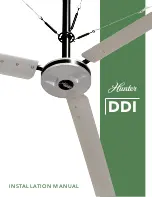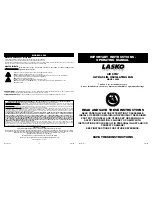
14
INSTALLATION
STEP 2: RETENTION SYSTEM
Secure first clamp on the loose
end of the cable.
Secure the remaining clamp in
the center of the two installed
clamps.
Secure the second clamp to the
cable approximately 6” from the
first clamp.
Orient the u-bolt on the “dead” end of the Retention Cable and the clamp on the “live” portion of the retention cable. If done
incorrectly, the U-bolt could crush the wire when tightened and can reduce the strength of the wire.
Dead End
Live End
B
Secure remaining cable
to itself with cable
clamps.
A
Wrap retention cable
around building structure
that can withstand double
the installed fan weight.
NOTE
Leave approximatlely 3”
of slack in the wire and
the cable at the top of the
downrod opening.
1/2”
socket or
wrench
CRUSH HAZARD. To prevent SERIOUS INJURY or DEATH, ALWAYS mount fan directly
from building structure that can withstand double the installed fan weight.
A
B
Summary of Contents for DDI
Page 1: ...1 DDI INSTALLATION MANUAL ...
Page 25: ...25 ...












































